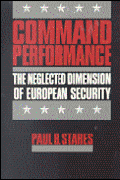For more than forty years, NATO has concentrated on deterring the now dramatically diminished threat of deliberate aggression by the Warsaw Pact. Despite numerous assessments of the European military balance and NATO’s security requirements, the adequacy of NATO’s command and control system, which the alliance would depend on to deter attack and defend itself, has received scant attention. This neglect, as Paul Stares argues, stems from a larger oversight in the way security threats are typically assessed and military needs defined. The standard approach is to focus on the relative quantity and quality of manpower and weaponry, while the vital contribution of command system performance to military effectiveness is almost always ignored.
Drawing on several in-depth case studies and other historical data, Stares analyzes the factors that commonly affect command performance. This lays the groundwork for a full assessment of NATO’s crisis management and wartime command arrangements. he finds that NATO’s command system has been neglected in a fundamental way, resulting in serious deficiencies that raise sobering doubts about NATO’s capacity to control its forces in a crisis and direct them effectively in wartime.
Author

